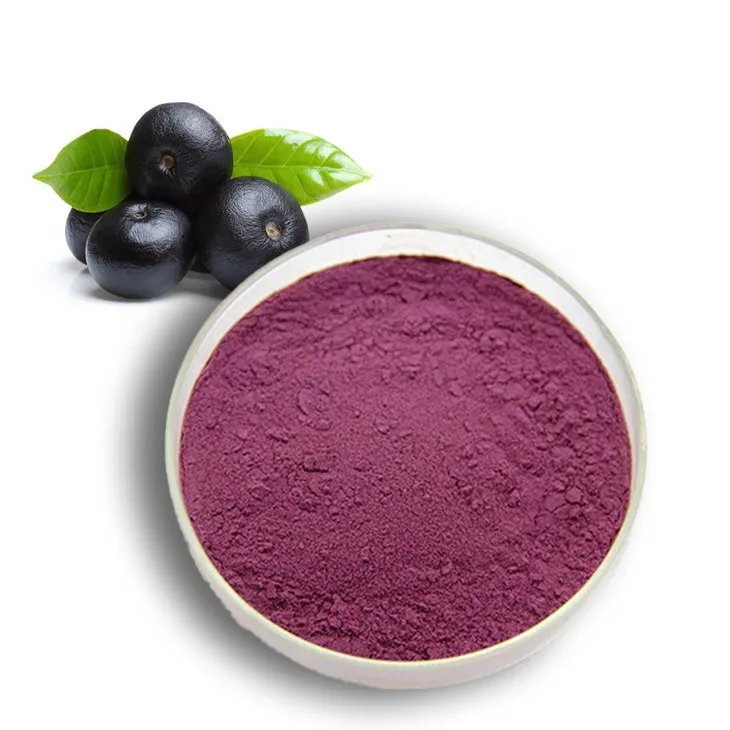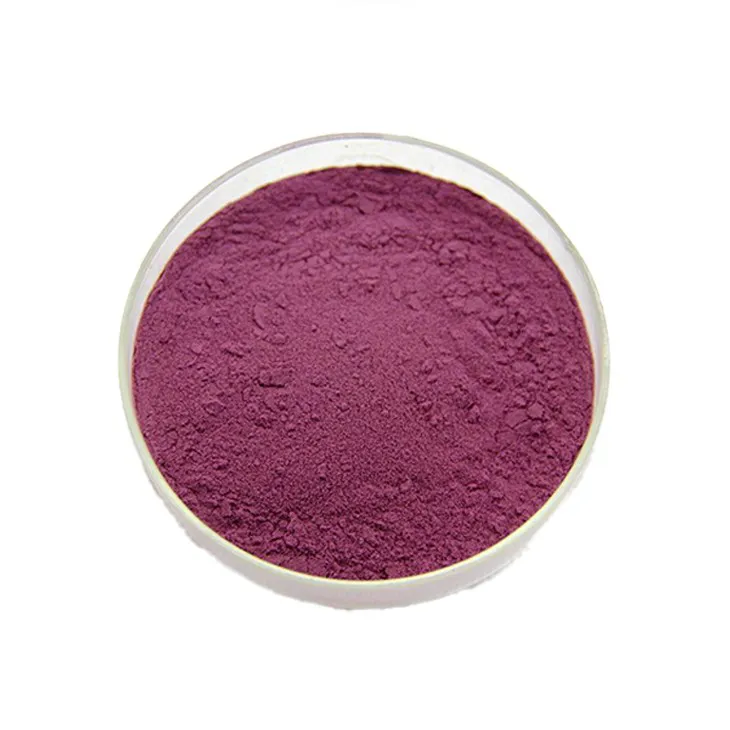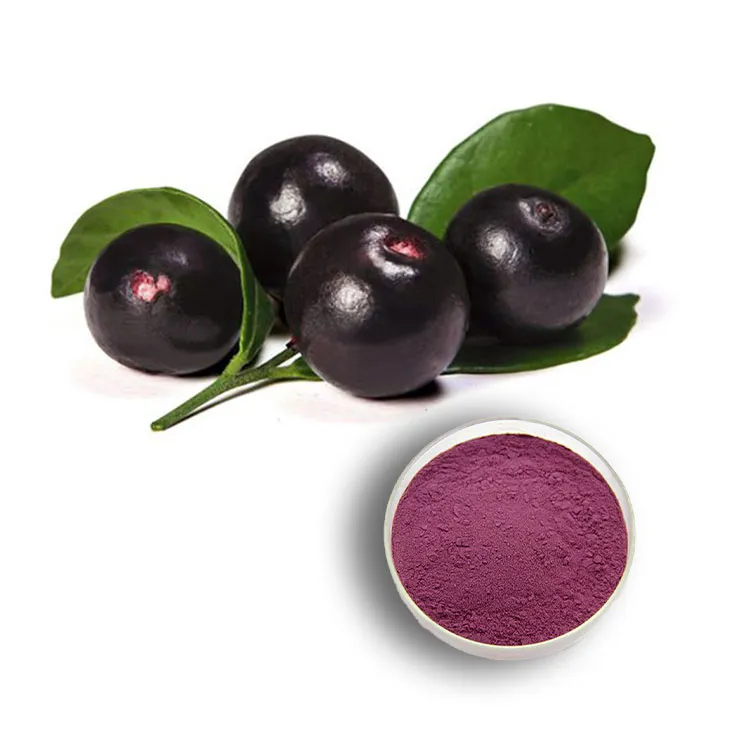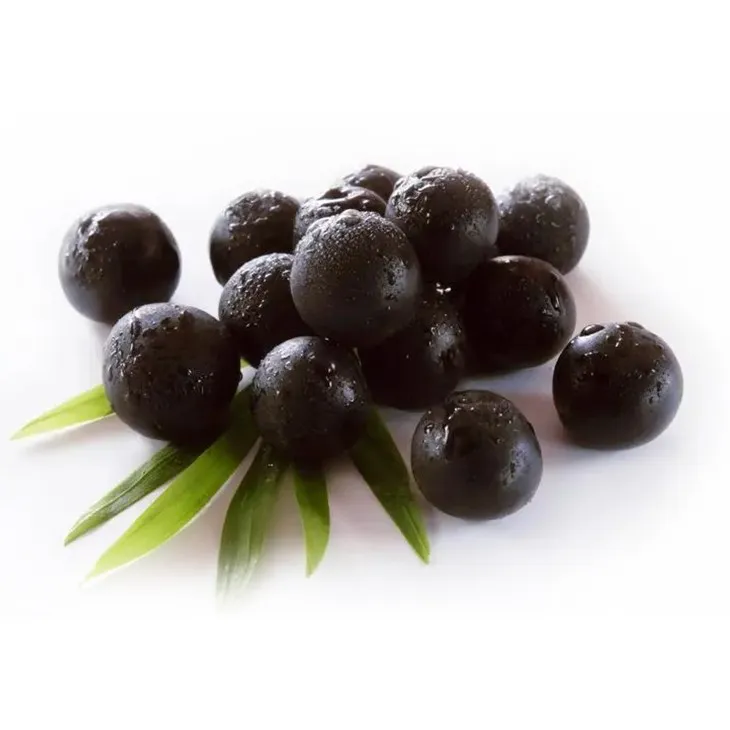- 0086-571-85302990
- sales@greenskybio.com
Acai Berry Extract: Should You Use It for Skin Care?
2024-11-13

Introduction
In recent years, the beauty and skincare industry has been constantly on the lookout for new and effective ingredients. Brazilian Acai Berry Extract has emerged as a popular contender in this realm. Originating from the Amazon rainforest, this small, purple berry has a rich history of use in traditional medicine. But does it really live up to the hype when it comes to skincare? This article will explore the various aspects of acai berry extract to help you decide whether it should be a part of your skincare routine.

Antioxidant Content of Acai Berry Extract
One of the most significant properties of Acai Berry Extract is its high antioxidant content. Antioxidants play a crucial role in maintaining healthy skin by combating free radicals. Free radicals are unstable molecules that can cause damage to the skin cells, leading to premature aging, wrinkles, and a dull complexion.
Acai berries are rich in anthocyanins, which are powerful antioxidants responsible for the deep purple color of the berries. These anthocyanins have been shown in several studies to be effective in neutralizing free radicals. For example, a study published in a well - known dermatology journal found that when acai berry extract was applied topically to the skin of test subjects, there was a significant reduction in the levels of free radicals compared to the control group.
Another antioxidant present in acai berry extract is vitamin C. Vitamin C is not only an antioxidant but also plays a key role in collagen synthesis. Collagen is a protein that gives the skin its structure and elasticity. As we age, collagen production decreases, leading to sagging skin and wrinkles. By providing a source of vitamin C, acai berry extract may help to boost collagen production, thereby reducing the signs of aging.

Improving Skin Hydration
Good skin hydration is essential for maintaining a healthy, glowing complexion. Acai berry extract may have potential benefits in improving skin hydration.
How it Works
The extract contains fatty acids, such as oleic acid and linoleic acid. These fatty acids help to strengthen the skin's natural barrier function. The skin's barrier is responsible for preventing water loss from the skin. When this barrier is intact and functioning well, the skin is better able to retain moisture, resulting in hydrated and supple skin.
In addition, acai berry extract also contains polysaccharides. These substances can attract and bind water molecules, further enhancing the skin's hydration levels. A study on skin cells in vitro showed that when exposed to acai berry extract, the cells had increased water - holding capacity, indicating its potential role in skin hydration.

Enhancing Skin Texture
A smooth and even skin texture is a desirable trait in skincare. Acai berry extract may contribute to improving skin texture through multiple mechanisms.
Exfoliation
Some components of acai berry extract have mild exfoliating properties. They can help to remove dead skin cells from the surface of the skin. Dead skin cells can build up and make the skin look dull and rough. By gently sloughing off these cells, acai berry extract can reveal the fresh, healthy skin underneath, resulting in a smoother texture.
Cell Regeneration
The antioxidants in acai berry extract can also stimulate cell regeneration. When skin cells are damaged or die, new cells need to be generated to replace them. By promoting cell regeneration, the extract can help to improve the overall texture of the skin. For example, in a small - scale clinical trial, participants who used a skincare product containing acai berry extract for a certain period reported a noticeable improvement in the smoothness of their skin.

Possible Side Effects of Acai Berry Extract
While acai berry extract has many potential benefits for the skin, it's also important to be aware of possible side effects.
- Allergic Reactions: Some individuals may be allergic to acai berries. Symptoms of an allergic reaction can include redness, itching, and swelling of the skin. If you have a history of allergies, especially to berries or other fruits, it's advisable to do a patch test before using any skincare product containing acai berry extract.
- Skin Irritation: In some cases, especially if the extract is used in high concentrations or if the skin is particularly sensitive, it may cause mild irritation. This can manifest as a stinging or burning sensation on the skin.
Comparison with Other Popular Skincare Ingredients
In the world of skincare, there are many popular ingredients, each with their own set of properties and benefits. How does acai berry extract compare?
Vitamin C
As mentioned earlier, acai berry extract contains vitamin C. However, compared to pure vitamin C serums, the concentration of vitamin C in acai berry extract may be lower. Vitamin C serums are often formulated with high concentrations of vitamin C for maximum antioxidant and collagen - boosting effects. While acai berry extract can contribute to the overall antioxidant content of the skin, it may not be as potent as a dedicated vitamin C product in terms of collagen synthesis.
Hyaluronic Acid
Hyaluronic acid is well - known for its excellent hydrating properties. It can hold a large amount of water, making it a go - to ingredient for plumping and hydrating the skin. While acai berry extract can improve skin hydration through its fatty acids and polysaccharides, it may not be as effective as hyaluronic acid in retaining large amounts of water. However, the two ingredients can potentially be used together in a skincare routine for enhanced hydration.
Retinol
Retinol is a popular anti - aging ingredient that works by increasing cell turnover and promoting collagen production. Acai berry extract also has antioxidant properties and can contribute to collagen production, but in a different way. Retinol can be more aggressive in its effects, which may lead to skin irritation in some cases, especially for those with sensitive skin. Acai berry extract, on the other hand, is generally milder and may be a better option for those who cannot tolerate retinol.
Conclusion
Brazilian acai berry extract has a number of potential benefits for the skin, including its antioxidant content, ability to improve hydration, and potential to enhance skin texture. However, like any skincare ingredient, it also has possible side effects, and its effectiveness may vary compared to other popular ingredients. If you're considering adding acai berry extract to your skincare routine, it's a good idea to do some research on the products available, check for any potential allergies, and perhaps start with a small - scale test to see how your skin responds. Overall, while it may not be a miracle ingredient, it can be a valuable addition to a comprehensive skincare approach.
FAQ:
1. What are the main antioxidant components in Acai Berry Extract?
Acai Berry Extract contains a variety of antioxidant components. One of the main ones is anthocyanins. These compounds are highly effective in neutralizing free radicals. Free radicals can cause damage to skin cells, leading to premature aging. The anthocyanins in acai berry extract can help prevent this damage by donating electrons to the free radicals, thereby making them less reactive.
2. How does Acai Berry Extract improve skin hydration?
Studies suggest that Acai Berry Extract may improve skin hydration through multiple mechanisms. It contains certain fatty acids that can help strengthen the skin's natural lipid barrier. A healthy lipid barrier is crucial for preventing water loss from the skin. Additionally, some of the nutrients in the extract may stimulate the production of skin - natural moisturizing factors (NMF), which can hold water in the skin and keep it hydrated.
3. Are there any side effects of using Acai Berry Extract for skin care?
While Acai Berry Extract is generally considered safe for topical use in skincare, some people may experience minor side effects. These can include skin irritation, redness, or itching, especially in those with sensitive skin. However, such side effects are relatively rare. It is always advisable to do a patch test on a small area of skin before using any new skincare product containing Acai Berry Extract.
4. How does Acai Berry Extract compare to Vitamin C in skincare?
Both Acai Berry Extract and Vitamin C are beneficial for the skin, but they have different properties. Vitamin C is well - known for its ability to brighten the skin and boost collagen production. Acai Berry Extract, on the other hand, has a strong antioxidant profile that focuses more on combating free radicals. While Vitamin C can also act as an antioxidant, acai berry extract may offer a broader range of antioxidant protection. However, Vitamin C has been more extensively studied in skincare, and its effects are more widely understood.
5. Can Acai Berry Extract really reduce signs of aging?
There is evidence to suggest that Acai Berry Extract can help reduce signs of aging. Its antioxidant properties play a key role in this. By neutralizing free radicals, it can prevent damage to collagen and elastin fibers in the skin. Collagen and elastin are important for maintaining skin's firmness and elasticity. As we age, these fibers break down, leading to wrinkles and sagging skin. Acai Berry Extract may slow down this process, thus reducing the appearance of aging signs.
Related literature
- The Antioxidant Potential of Acai Berry in Skin Health"
- "Acai Berry Extract: A New Ingredient for Skincare? A Comprehensive Review"
- "Comparative Study of Acai Berry and Other Antioxidant - Rich Ingredients in Skin Hydration"
- ▶ Hesperidin
- ▶ citrus bioflavonoids
- ▶ plant extract
- ▶ lycopene
- ▶ Diosmin
- ▶ Grape seed extract
- ▶ Sea buckthorn Juice Powder
- ▶ Beetroot powder
- ▶ Hops Extract
- ▶ Artichoke Extract
- ▶ Reishi mushroom extract
- ▶ Astaxanthin
- ▶ Green Tea Extract
- ▶ Curcumin Extract
- ▶ Horse Chestnut Extract
- ▶ Other Problems
- ▶ Boswellia Serrata Extract
- ▶ Resveratrol Extract
- ▶ Marigold Extract
- ▶ Grape Leaf Extract
- ▶ blog3
- ▶ blog4
- ▶ blog5
-
Organic Tongkat Ali extract powder factory.
2024-11-13
-
How to make powder with ashwagandha extract.
2024-11-13
-
Rosehip extract manufacturers from China.
2024-11-13
-
The best cat's claw extract in nature.
2024-11-13
-
Chinese Dandelion Leaf Extract Suppliers.
2024-11-13
-
Ginseng Root Extract
2024-11-13
-
Pueraria Lobata Extract
2024-11-13
-
Medicinal Marshmallow Extract
2024-11-13
-
Chaste Berry Extract
2024-11-13
-
Peppermint Extract Powder
2024-11-13
-
Licorice Root Extract Powder
2024-11-13
-
Elderberry Extract
2024-11-13
-
Nutmeg Extract
2024-11-13
-
Wheat Germ Extract
2024-11-13
-
Panax Ginseng Leaf Extract
2024-11-13





















